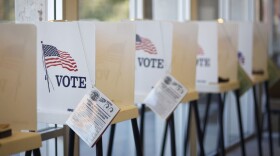Update: The second Medicaid expansion ballot question was rescinded on July 11.
South Dakota voters will decide two Medicaid expansion questions this November. State officials announced Thursday that an initiated measure gained enough signatures to be placed on the ballot.
A similar petition was validated in January. That effort took the form of a proposed constitutional amendment.
Rick Weiland is a co-founder of the group Dakotans for Health, which submitted the initiated measure petitions. He wants to create two paths for voters to approve expansion.
“The initiated amendment to the constitution and the initiated law accomplish the same thing,” Weiland said.
Organizers of the initiated measure want South Dakotans to vote for both changes. Doing so, Weiland said, “will send a strong message to our legislators in Pierre and the governor of our state.”
Medicaid is a joint federal-state program that funds health care for low-income adults under the age of 65. Often, hospitals never get paid for those patients' treatment. The 2009 Affordable Care Act gave states the opportunity to expand their programs to most adults whose income is below 133% of the federal poverty line. The majority of funding for expansion in South Dakota would come from the federal government.
“I think it’s long overdue,” Weiland said. “We’ve had over a decade to bring health care coverage to a very vulnerable part of our population.”
In 2016, then-governor Dennis Daugaard proposed a plan that would have included a “circuit breaker” in the case that federal dollars fell through. He faced opposition from many state legislators.
“I just don’t believe the federal government can maintain these programs like this on an indefinite basis,” Republican Rep. Jim Bolin told SDPB that year.
South Dakota activists have increasingly looked to initiated measures to force votes on policies opposed by state legislators. Weiland sees the recent defeat of Amendment C as evidence that voters are enthusiastic about ballot measures. If that change had passed in Tuesday's primary election, it would have meant certain future initiatives would have needed 60% of voters’ approval, including Medicaid expansion.
“That’s a hell of a message that’s being sent to the state Capitol,” Weiland said. “I have a belief that the elected representatives are going to pay a little more attention to what the people want.”




